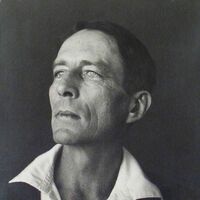De Rerum Virtute
I.
Here is the skull of a man: a man’s thoughts and emotions
Have moved under the thin bone vault like clouds
Under the blue one: love and desire and pain,
Thunderclouds of wrath and white gales of fear
Have hung inside here: and sometimes the curious desire of knowing
Values and purpose and the causes of things
Has coasted like a little observer air-plane over the images
That filled this mind: it never discovered much,
And now all’s empty, a bone bubble, a blown-out eggshell.
II.
That’s what it’s like: for the egg too has a mind,
Doing what our able chemists will never do,
Building the body of a hatchling, choosing among the proteins:
These for the young wing-muscles, these for the great
Crystalline eyes, these for the flighty nerves and brain:
Choosing and forming: a limited but superhuman intelligence,
Prophetic of the future and aware of the past:
The hawk’s egg will make a hawk, and the serpent’s
A gliding serpent: but each with a little difference
From its ancestors—and slowly, if it works, the race
Forms a new race: that also is a part of the plan
Within the egg. I believe the first living cell
Had echoes of the future in it, and felt
Direction and the great animals, the deep green forest
And whale’s-track sea; I believe this globed earth
Not all by chance and fortune brings forth her broods,
But feels and chooses. And the Galaxy, the firewheel
On which we are pinned, the whirlwind of stars in which our sun is one dust-grain, one electron, this giant atom of the universe
Is not blind force, but fulfils its life and intends its courses. “All things are full of God.
Winter and summer, day and night, war and peace are God.”
III.
Thus the thing stands; the labor and the games go on—
What for? What for?—Am I a God that I should know?
Men live in peace and happiness; men live in horror
And die howling. Do you think the blithe sun
Is ignorant that black waste and beggarly blindness trail him like hounds,
And will have him at last? He will be strangled
Among his dead satellites, remembering magnificence.
IV.
I stand on the cliff at Sovranes creek-mouth.
Westward beyond the raging water and the bent shoulder of the world
The bitter futile war in Korea proceeds, like an idiot
Prophesying. It is too hot in mind
For anyone, except God perhaps, to see beauty in it. Indeed it is hard to see beauty
In any of the acts of man: but that means the acts of a sick microbe
On a satellite of a dust-grain twirled in a whirlwind
In the world of stars ....
Something perhaps may come of him; in any event
He can’t last long.—Well: I am short of patience
Since my wife died... and this era of spite and hate-filled half-worlds
Gets to the bone. I believe that man too is beautiful,
But it is hard to see, and wrapped up in falsehoods. Michael Angelo and the Greek sculptors—
How they flattered the race! Homer and Shakespeare—
How they flattered the race!
V.
One light is left us: the beauty of things, not men;
The immense beauty of the world, not the human world.
Look—and without imagination, desire nor dream—directly
At the mountains and sea. Are they not beautiful?
These plunging promontories and flame-shaped peaks
Stopping the sombre stupendous glory, the storm-fed ocean? Look at the Lobos Rocks off the shore,
With foam flying at their flanks, and the long sea-lions
Couching on them. Look at the gulls on the cliff wind,
And the soaring hawk under the cloud-stream—
But in the sage-brush desert, all one sun-stricken
Color of dust, or in the reeking tropical rain-forest,
Or in the intolerant north and high thrones of ice—is the earth not beautiful?
Nor the great skies over the earth?
The beauty of things means virtue and value in them.
It is in the beholder’s eye, not the world? Certainly.
It is the human mind’s translation of the transhuman
Intrinsic glory. It means that the world is sound,
Whatever the sick microbe does. But he too is part of it.

